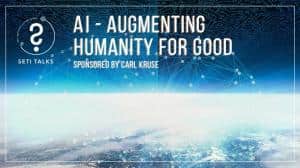An upcoming discussion on the wide-ranging issues surrounding artificial intelligence and their impact on humanity.
MIAMI, FL, USA, January 14, 2022 /EINPresswire.com/ — It is difficult to imagine how much Artificial Intelligence (AI) is implemented on a daily basis. Society seems to be standing at a pivotal point in which we can reckon what the future of AI may hold.
From its inception, AI’s fundamental goals ranged from complex learning, problem solving, planning, and towards the representation of knowledge. It is now used by Google, YouTube, and Netflix. Of course, the goals of AI lends it to so many applications that humanity’s relationship with the machine must take on a novel, more profound, adjustment.
Humanity and the machine have wavered in their relationship through the centuries. We think of the nineteenth century Luddites smashing up the machinery of wool and cotton mills out of fear for their jobs; and, then, the happy travels brought about by the steam engine. It appears as a complex blend of excitement and anxiety. The twentieth century shows this blend perfectly in much of its cultural artifacts – the genre of science-fiction being a concise example – and now AI has revealed this complex feeling in the twenty-first century.
Despite what the cultural feeling may be around technology, it continues to embrace new ideas and new areas of application. It is the same with AI. It is precisely this all-embracing capability that has led to suspicious anxiety over the role AI will, or may already be, taking in our lives. The malicious capability to manipulate data, to hack information, and to "control" people is a line of thought that has not gone unnoticed in recent years.
However, on the opposite side of the spectrum, lies more optimistic strains of thought. Given that AI can analyze, interpret, and learn rapidly from vast amounts of data, it is thought a boon to many areas of research that will only make humanity’s life easier – in-depth diagnostics of health and mental disorders, weather warnings and other crisis events. AI’s complexity may allow it to take over tedious jobs, freeing up humanity to pursue greater means.
All is not clear at this time, and that is why the SETI Institute has organized a chat on the wide-ranging issues surrounding artificial intelligence. The Institute has invited Siddha Ganju and Alex Lavin, two AI experts, inventors and entrepreneurs, to deliver a talk on all things AI. James Parr, CEO of the company Trillium, will be acting as mediator for the conversation. The goal of the chat is an accessible conversation on a technology that is driving us into the future.
The online chat is slated for Wednesday, 19 January 2022 beginning at 6pm Pacific US time. Registration is required but free at https://www.eventbrite.com/e/seti-talks-ai-augmenting-humanity-for-good-tickets-239446590197
This SETI Talks is sponsored by Carl Kruse, Berlin Chair of the Princeton Alumni Association of Germany and curator of the Carlkruse.org Blog.
SETI Talks are presented to the public at no cost and are supported by contributions from supporters. If you are interested in sponsoring a future SETI Talks, please email SETI at development@seti.org .
=================
The SETI Institute, based in Mountain View, California, is the world's preeminent organization focused on the scientific search for extraterrestrial intelligence. Its more than 100 research scientists investigate the nature of the universe and the prevalence of life beyond earth.
Since 2015, the CarlKruse.org blog has highlighted non-profit organizations and people making the world a better place. The blog previously sponsored the SETI Talk: UAPs Are They Worth Scientific Attention? Blog members were involved in the SETI@Home project and closely follow developments in scientific research related to SETI, artificial intelligence and computer science.
Carl Kruse
Carlkruse.org
email us here
+49 1517 5190292
Visit us on social media:
Twitter
LinkedIn
Other
